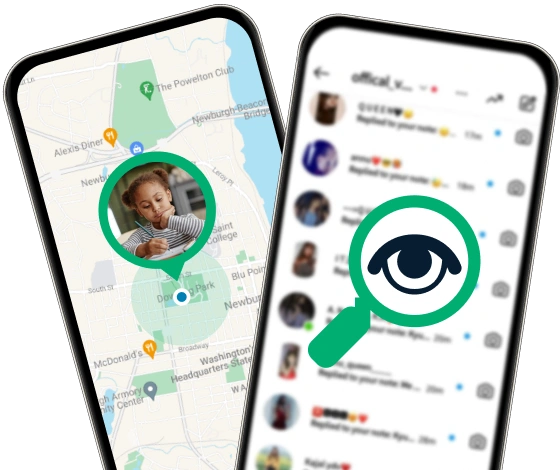All the processes taking place in the modern world cannot be imagined without the existence of the Internet. Of course, children also have access to it; however, the vastness of the network is not limited only to positive opportunities for development but also hides certain dangers. Therefore, today, more than ever, parents need to make every possible effort to keep kids safe as they browse the web. In this article, we will look at the most common types of dangers that your child can face online and how to prevent them in a timely manner.
General Tips for Parents
Needless to say, at a time when the Internet is an integral part of the life of most of humanity, the question of “How to keep kids safe online?” is becoming more and more acute. First, it is important to explain to your child that the Internet is a great space for opportunities but, at the same time, a very dangerous thing. And, of course, to comfortably enjoy the possibilities of the online world, you should introduce your kid to the rules of safe behavior on the Internet. Let’s look at some examples of such tips that your children can learn:
- I won’t provide any personal information without the adults’ consent;
- If I receive information that makes me feel uncomfortable, I’ll immediately tell my parents;
- I’ll never send my photos to someone I met online without consulting an adult;
- I won’t respond to letters or requests that cause discomfort or shame.
These few rules will help ensure Internet safety for kids. But, unfortunately, sometimes this may not be enough – various scammers and criminals can gain the trust of your children to such an extent that they forget about your advice. Or they’ll convince them that parents don’t have to know about this communication, or worse – intimidate them so that your child is simply afraid to turn to you for help. That is why there are special Internet safety tools.
What Are Parental Controls?
The generic term for parental monitoring of what a child does online is called parental control. In other words, parental control is both a special application and rules for using the Internet established in the family. In some cases, the installation of special applications that’ll monitor what the child’s doing online isn’t required. There are some easy-to-follow rules of parental control over gadgets and Internet use every parent should be aware of.
Protect Against Inappropriate Content
We have already talked about the rules of conduct that should be taught to children, so now, let’s delve into the use of technical capabilities for keeping kids safe on the Internet. In fact, there are many options – modern gadgets have parental control functions, and there are special programs that can be downloaded to your devices. There are also special search engines and Internet browsers for children – they filter content on the web and offer only results with information that is acceptable to kids. If a child enters an obscene word in the search bar, the system will give an error. One example of such a browser is Kiddle, a search engine for children from Google that works this way.
Protect Against Strangers Online
While everything is clear with the search for information on the Internet, then how to keep your child safe when there are so many scammers on social networks? This is an issue that can be solved with the help of Internet safety tools, namely the use of specifically designed programs. One of them is uMobix, one of the best utilities for tracking electronic devices. A program like uMobix allows you to:
- track the location of the device;
- monitor your child’s activity on social networks like Instagram, etc;
- manage programs downloaded to the gadget;
- view SMS, etc.
Apps like uMobix are developed specifically for parental control and are governed by a policy of complete privacy and are used solely for security reasons.
Online Trolls
In Internet terminology, a “troll” is a person who posts brutal or provocative messages; for example, they are frequent visitors to discussion forums, obstructing discussions or insulting their participants. Of course, if you are wondering how to keep kids safe online, you should keep in mind such dangers as well. Online trolls can offend your child, provoke conflict, or impose bad ideas, so you should also use parental controls to prevent this from happening.
Online Addiction
Internet addiction is called the disease of the 21st century. This is an obsessive desire to use the Internet, overuse it, and spend a lot of time online. Modern society hasn’t only become accustomed to the Internet but dependent on it.
Unfortunately, people who suffer from online addiction usually have problems building social contacts, anxiety, and decision-making problems. And children are especially vulnerable to this – so when ensuring Internet safety for kids, parents must take this factor into account. Let’s look at some of the signs that your child is beginning to develop an online addiction:
- constant desire to be online;
- attention deficit disorder;
- refusal of live communication;
- the emergence of conflicts with others who don’t share excessive enthusiasm for the Internet.
To combat Internet addiction, the usual rules in the family may not be enough; a child who is fascinated by the online world won’t be obedient and listen to you. Therefore, special additional programs for keeping kids safe online will help you. Some of them will allow you to control the activity on your child’s device.
Online Footprints
With each passing year, the personal data of users on the web is growing. Social media information, online payments, location history, emails, and instant messaging are just some of the data that make up your digital footprint. The completeness of this digital portrait depends on your habits of dissemination of information and attitude to privacy on the Internet.
Unfortunately, this information can be used for criminal purposes, so you should thoroughly monitor your child’s digital footprints. Traces are created every time you enter some information on the web – this means that registrations on any sites, platforms, social networks, subscriptions to e-mails leave a digital footprint. Special programs, which we have already mentioned, are suitable for keeping kids safe online and monitoring their activity.
Online Scams
Have you ever received a message that you have won a car or a large sum of money? Of course, a conscious adult understands – these are the antics of fraudsters. But unfortunately, the child can fall victim to such things and follow the dangerous links or leave contact information on the sites of attackers. Internet safety tools should also be used to protect your child in such cases.
Fake Antivirus
The next danger that can await your child as an inexperienced user of the Internet is fake antivirus. If you don’t use parental controls, and therefore your kid has access to almost all content on the web, they may come across such things. How does it work? The child goes to the site, where they receive a fake warning that a virus has been found on the device, and they can get rid of it by installing the proposed antivirus. If a child downloads such a program, it may damage the gadget, capture sensitive information, and so on.
Social Media Scams
Another common type of fraud on the Internet is scamming on social networks. Unlike other malevolent schemes, the danger of this is that the attacker can find your child, communicate with them directly and find an individual approach. So, if you want to keep kids safe at all times, you should use special programs to track such scams on social media because children won’t always be willing to tell you about it.
Mobile Scams
Mobile fraudsters are criminals who contact people through a mobile phone number. This type of scam is probably the least dangerous – first, your child’s phone can simply block calls and messages from unknown numbers. In addition, if fraud on social networks is based on an individual approach and attackers can constantly annoy your kids, the mobile scammers are usually targeted at a large number of people, so if their message is ignored, they won’t continue.
Social Engineering Scams
Social engineering scam is a type of manipulative content on the Internet, usually on social networks, aimed at gathering confidential information. Things like phishing, baiting, etc., are also types of social engineering fraud. And while it is possible to prevent this on the Internet by simply enabling parental control on your child’s device, you can also use special programs to follow this third-party activity on social media and timely eliminate it.
Cyber Bullying
Unfortunately, cyberbullying is one of the main problems among modern children and adolescents. Unlike other dangers on the Internet, bullying is dangerous because your child will be afraid to tell you about it. Maybe they’ll decide that they can handle it themselves, or they’ll just be intimidated, but the essence does not change – the best way to protect a child from bullying is to monitor these processes without their knowledge using special programs.
Tools for Keeping Children Safe Online
We have already mentioned several ways how to keep your child safe on the Internet, and now it can be concluded that the use of special apps is the most convenient. Let’s explore some examples of such:
uMobix
We have already mentioned the uMobix phone tracking program. It is considered one of the best applications for monitoring activity on the phone and social networks. If you are set to choose a spyware program, it is recommended to start with this one.
SpyBubble
Another worthy recommendation is SpyBubble. With it, you can also track your child’s activity online and do it without getting caught.
Cocospy
The last but not the least effective spyware program in our selection is Cocospy. This app is popular all over the world. It is convenient because it does its job unnoticed, has almost no effect on battery consumption, and allows you to spy without the knowledge of the device owner.
Conclusion
One of the goals of today’s parents who care about their child’s safety online is to protect them from inappropriate content on the web. In this case, teaching a child rule of conduct online isn’t enough because your kid may accidentally follow a link with specific content or search the Internet for words that they don’t understand just because they are interested in the meaning behind them.
So here you cannot miss the opportunities offered by technology developers; you can use the built-in parental control function on your devices, if any, give your child access to special browsers, or use a special program that allows you to track the activity on your child’s gadget. Sometimes such apps even let you control it remotely, block inappropriate content, etc.
FAQ
Although there are many ways, the best solution for parents would be to use special parental control applications. The best tools to keep kids safe online are listed in the article.
Any social media allows registration from a certain age, so don’t worry about it. For example, Instagram users must be at least 13 years old. This age is enough to allow a child to use social networks.
Since it’s impossible to block all malicious sites manually, you can use parental controls, which will automatically hide all unacceptable content on the Internet.





